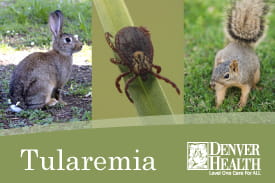Tularemia, commonly referred to as "rabbit fever", is a potentially serious illness that occurs naturally in the United States. It is caused by the bacterium Francisella tularenis found in animals (especially mice and mouse-like animals, rabbits and beavers.) Download our Tularemia fact Sheet.
How is Tularemia spread?
People can get Tularemia by:
- Being bitten by an infected tick, deer fly or other insect.
- Handling infected animal carcasses.
- Eating or drinking contaminated food or water.
- Breathing in the bacteria.
- Touching grass or plants where infected animals have been, like gardens or yards.
What are the symptoms of Tularemia?
Symptoms of Tularemia usually appear in three to five days after exposure to the bacteria, but can take as long as 14 days to appear. Symptoms vary depending on where the bacteria enter the body (through skin, lungs, the eye, in contaminated food/water, or by tick or deer fly bite.)
Symptoms can include:
- Sudden high fever and chills.
- Headache.
- A skin sore from a tick or fly bite.
- Swollen, painful lymph nodes.
- Sores in the mouth, sore throat, vomiting (from eating contaminated food).
- Cough, chest pain, difficulty breathing (from breathing in contaminated dust).
- Eye pain, redness and swelling, and a sore on the inside of the eyelid.
- Exhaustion.
Tularemia is not known to be spread between people. People who have tularemia do not need to be isolated. People who have been exposed to the tularemia bacteria should be treated as soon as possible. The disease can be fatal if it is not treated with the right antibiotics.
How is Tularemia treated?
Your doctor will most likely prescribe antibiotics for treatment.
What can I do to prevent becoming infected with Tularemia?
- Use insect repellent containing DEET on our skin and clothing to prevent insect bites.
- Wash your hands often, using soap and warm water, especially after handling animals and animal carcasses.
- Cook your food thoroughly and ensure your water is from a safe source.
- Be aware of any change in the behavior of your pets (especially rodents, rabbits and hares), including dogs and livestock. Consult a veterinarian if you notice unusual behavior in your pets.
What should I do if I think I have Tularemia?
Consult your doctor at the first sign of illness.
For more information, call Denver Public Health at 303-602-3614.
Sources:



